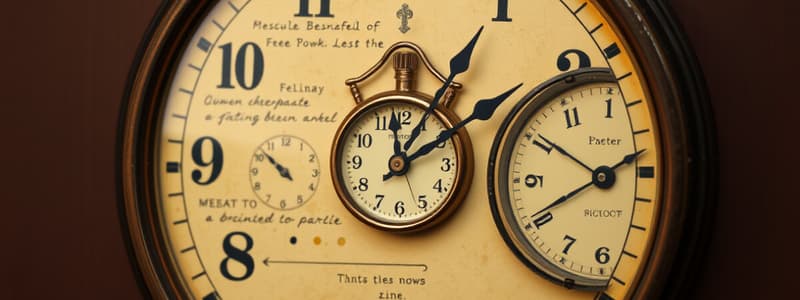Podcast
Questions and Answers
What is Chronemics?
What is Chronemics?
The study of how we use and interpret time.
What influences daily communication according to Time Orientation?
What influences daily communication according to Time Orientation?
How time influences your daily communication.
Which of the following is a type of Psychological Time Orientation?
Which of the following is a type of Psychological Time Orientation?
- Past
- Present
- Future
- All of the above (correct)
What is a characteristic of Past Time Orientation?
What is a characteristic of Past Time Orientation?
What does Present Time Orientation emphasize?
What does Present Time Orientation emphasize?
What defines Future Time Orientation?
What defines Future Time Orientation?
What are the Biological Time Orientations?
What are the Biological Time Orientations?
What does Olfactics study?
What does Olfactics study?
What is Smell Memory?
What is Smell Memory?
What is the impact of color on psychological effects?
What is the impact of color on psychological effects?
What is the ideal temperature for productivity?
What is the ideal temperature for productivity?
What distinguishes Polychronic from Monochronic cultures?
What distinguishes Polychronic from Monochronic cultures?
Flashcards are hidden until you start studying
Study Notes
Chronemics
- Study of how time influences communication and interpersonal interactions.
Time Orientation
- Influences daily behaviors and communication styles.
- Psychological Time Orientations categorized into three types: past, present, and future.
Psychological Time Orientations
- Past Orientation:
- Decisions based on historical events and values.
- Cultures with this orientation respect ancestors and prior experiences.
- Present Orientation:
- Emphasis on living in the moment due to uncertainty about the future.
- Common among youth and economically challenged communities.
- Future Orientation:
- Planning and preparing for upcoming events and goals.
- Often shifts focus to this orientation when starting a family.
Biological Time Orientations
- Reflection of physical reactions to time and biorhythms.
- Influences daily activities based on personal health and energy levels.
Biological Time Orientations Cycles
- Physical Cycle: 23-day cycle affecting physical vitality.
- Sensitivity Cycle: 28-day cycle impacting emotional responsiveness.
- Intellectual Cycle: 33-day cycle influencing cognitive capacity.
Olfactics
- Study of scent and its impact on communication.
- Memory and emotional responses can be triggered by specific scents.
Olfactics Details
- Scent influences the beginning or end of communication.
- The deodorant industry is valued at around 3 billion dollars.
- Scientific attempts to isolate human pheromones have largely been unsuccessful.
Smell Memory
- Triggered by scents that evoke past experiences and associations.
- Four components of Smell Memory:
- Origination: Questions the source of a smell (e.g., sweat).
- Attachment: Reflects personal relationships linked to certain scents.
- Environment: Places associated with particular smells bring back memories.
- Smell Adaptation: Adjustment to environments that initially had unpleasant odors.
Tracking Time Orientations
- Informal Time:
- Loosely tracked, using relative terms (e.g., “I’ll be there in a bit”).
- Technical Time:
- Scientific and precise methods for measuring time.
- Formal Time:
- Recognizable structures such as calendars or event tracking.
Components of Formal Time
- Ordering:
- Establishes starting points for processes (e.g., weekly routines).
- Cycling:
- Marking resets, such as new months or years.
- Valuation:
- The worth assigned to time, influencing decisions.
- Synthesis:
- Combination of processes and the cumulative nature of time.
Polychronic vs. Monochronic
- Polychronic:
- Engages in multiple activities simultaneously.
- Monochronic:
- Focused on one task at a time, common in U.S. culture.
Impact of Color
- Colors have psychological effects, influencing mood and perceptions.
- Warm hues (e.g., gold, pink) create calming environments.
- Blue can evoke somber feelings and is often used in restaurants for ambiance.
- Bright lighting corresponds to faster-paced activities (e.g., fast food), while dim lighting slows down interactions (e.g., grocery stores).
Impact of Temperature
- Ideal productivity is associated with a temperature of 64 degrees.
- Excessive exposure to prolonged blue skies can lower productivity.
Studying That Suits You
Use AI to generate personalized quizzes and flashcards to suit your learning preferences.

